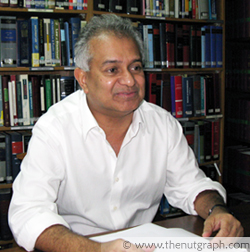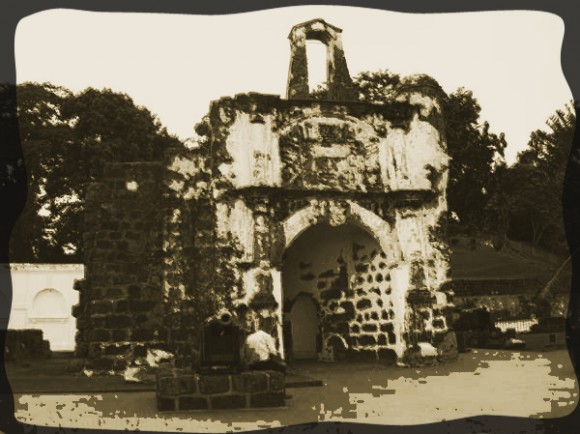
KUALA LUMPUR, 13 June 2011: The Malay peninsula was colonised exactly 500 years ago this year, and its significance in our history should be marked in some way by universities and scholars, lawyer Tommy Thomas said.
“We should be having public seminars and academic conferences to remember and discuss this aspect of our history on its 500th anniversary,” he said.
Thomas expressed disappointment that nearly half a year had gone by and no institution has announced any such initiative.
Thomas, who is also a student of history, said remembering that the Malay peninsula was colonised half a millennium ago was one way to remind the post-Independence generation of Malaysians to be grateful for Merdeka.
“It is critical to teach the present generation about the dangers of empire and colonialism, so that we can celebrate what independence means and pay tribute to the people who fought for it,” he said in an interview at his office on 25 May 2011.
“However critical we may be of our government and institutions, at the end of the day, we must appreciate Malaysia as an independent, sovereign nation which justly has a place in the world community,” he said.
Thomas noted that since 1511, when the Portuguese invaded and colonised Malacca, parts of the Malay peninsula, beginning with the trading port, have only experienced 54 years of self-governance.
“In the 446 years between 1511 and 1957, Malaya was colonised by three European powers and one Asian,” he said.
The Portuguese colonised Malacca from 1511 to 1641, and the Dutch from 1641 to 1824. The British were in Malaya from 1786 to 1941, when the Japanese invaded and took over until 1945. The British then returned to continue its rule over Malaya until 1957, when the country gained independence.
Additionally, for a period of 38 years between 1786 and 1824, two European powers ruled parts of Malaya – the British over Penang and the Dutch over Malacca.
Thomas said Malaysia’s colonial history is probably unique in the annals of imperialism in that we were colonised by four foreign powers.
New forms of colonialism
True nationalism, Thomas said, meant being wary of different forms of colonialism and standing united against any foreign occupation, and not the current jingoism that pits the different races against each other in a plural society.
Thomas noted that even though Malaysia was no longer colonised, new forms of financial, economic and cultural imperialism have developed. He cited Hollywood films and obsession with English football as subtle cultural imperialism Malaysians are addicted to.
“What is critical is for public discussion on the effects of empire and imperialism. It is not healthy to pretend that we were never under colonial yoke, and that our history only begins with Merdeka in 1957,” he argued, asking for a public debate to begin.

Admittedly, he said, Malaysia did benefit from some colonial legacies such as the civil service, educational, transportation and legal system, parliamentary democracy, and the English language.
He observed that Malaysians are resilient to foreign influence, having retained our religions, culture, food, dress, and other aspects of our identity despite the presence of various colonial powers and the duration of colonialism.
No imminent threat
Thomas said there was no imminent threat of Malaysia being colonised again through brutal invasion by any of its four former colonisers.
“Since Merdeka, Malaysia enjoys the best of relations with the four colonial powers. Should we seek reparations from each of them or at least a public apology are matters worthy of public debate,” he said.
However, he noted with regret that colonialism involving invasion and occupation still exists in the 21st century.
“The US is the most dangerous colonial power in the 21st century. Since 11 Sept 2001, the US has invaded and occupied two sovereign states – Iraq and Afghanistan. Both countries remain colonised even though Osama bin Laden has been executed and the public justification for invading Afghanistan has disappeared. There was none for Iraq,” Thomas noted.
He added that Malaysia was fortunate in that the country was not deemed to be of strategic importance to the policymakers in Washington, DC, and hence, Malaysia was not likely to be occupied by the US. ![]()


Ida Bakar says
Are we really colonised for 500 years? That depends on who writes the history. Yes, Melaka was in Portuguese hands in 1511 but there was the Johor-Riau-Lingga Sultanate that was fighting the Portuguese and later the Dutch. The kingdom become another fiefdom of the VOC only in 1818. That is 300 years after the fall of Melaka.
Furthermore, the Northern States were on and off under Siam’s suzerainty (local superpower) and in many aspects independent, self governing sultanates. The British become heavily involved in [the] later parts of the 19th century. Kedah acknowledged a British Adviser only in 1923. As non-federated Malay states (with the inclusion of Johor) with British residents as advisers on external policies, these states still managed many of their own internal policies. Even Siam accepted certain policies of the European superpowers but was not deemed colonised. Therefore, ‘colonisation’ in these states are somewhat different from those of the Straits Settlements and the Federated Malay States.
Then, there are Sabah and Sarawak with their own story.
Therefore, to say that after 1511 the whole of what is now Peninsular Malaysia was ‘colonised for 500 years’ begs the question what Mr Thomas meant by colonisation and colonialism. Melaka under the Portuguese and the Dutch was a bastion of the occupiers not unlike the Krak des Chevaliers Crusader Castle in Syria or The Green Zone in Baghdad.
Perhaps another example of colonialism in the nusantara is that of the Spaniards (and later the Americans) in the Philippines. There the whole indigenous culture was lost and what was left was the language.
So, I don’t think 1511 should be taken as the beginning of 500 years of colonisation.
Perhaps we should be more concern with the cultural imperialism of the USA that is so prevalent in Malaysia. As a Malaysian living in the UK the presence of the USA is felt more strongly in my old country.
Pillay says
Malaysia was not colonised for 500 years but the colonisation started in 1511. It has to begin somewhere. In our case it started with Malacca in 1511. The first point of interest in Malaysia by European powers soon have more coming our way. We became an independent and free country 56 years ago. We were colonised for 446 years. But it certainly began in 1511.
Think about GM food! That is a new form colonisation – one very well planned and strategised by US. Some parts of the world have fallen and it has not headed in this direction yet but it attacks our agriculture sector and colonises our food!!! What more can I say!
orang lama lama says
It is interesting to note that prior to the coming of the Portuguese, there was a lot of sea trade along the straits of Malacca in spite of the high pirate activity present. There were also 2 known non-Muslim centres, one in Kedah and another in Johor, near the present Kota Tinggi. Both did not survive the continuous onslaught of pirate activity. Malacca also experienced high pirate activity and only during the British occupation did they subdue the pirates using a steam driven gun boat. This was able to sail against the wind and caught the pirates unprepared. Commerce increased after this. The term “lanun” for pirates is named after the Philippine Island called Ilanun – now called by another name. […]
Farouq Omaro says
The British ended the slavery of the Orang Asli and JWW Birch was killed for this. Sabah was colonised long before the British came, by the Bruneians and the Suluks. When we talk of colonialists, it must mean all those who colonised us, not just Europeans.
m.k. says
A very good recap of Malaysian history as we studied in school in the 60’s. I don’t think the present generation can recount all this so clearly.
Jess says
America is NOT the most dangerous colonial power in the 21st century. CHINA is. America’s power peaked in the 20th centry and is on the wane now. China’s intransigent posturing on Tibet, Taiwan, the Indian and Vietnamese borders, North Korea, the South China Sea, Sri Lanka, East Timor, Africa and Latin America are only glimpses of things to come this century. Don’t be too quick to wish for America’s demise. For a small country like Malaysia, it is better to have competing super powers than a singular super power.